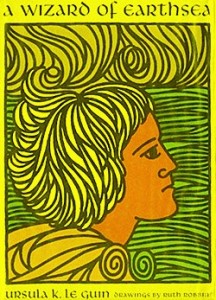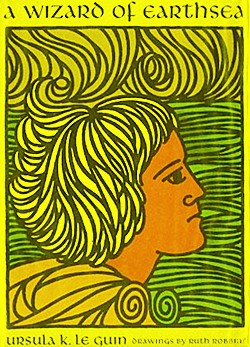 *Spoiler Alert* This week we look at chapters 4 and 5 of Ursula K. Le Guin’s A Wizard of Earthsea.
*Spoiler Alert* This week we look at chapters 4 and 5 of Ursula K. Le Guin’s A Wizard of Earthsea.
First, I apologize for the lateness of this post; I will be sure and have this week’s discussion up on Saturday as promised.
As expected, Ged, in his arrogance, attempts to trump his rival and unwittingly unleashes a horrible shadow being into the world. The experience humbles him, and he retreats within himself, fearful of his own power. After struggling with his inner demons, he graduates to the role of sorcerer, and is tasked with protecting an island community from nearby dragon spawn, though he still struggles to deal with the thing he has unleashed. Eventually it finds him again, and Ged forms a pact with the dragon through the knowledge of its name to protect the community before venturing out to stop the shadow before it consumes him.
The way I see it, there were two ways the events in Chapter four could have ended. He could have been humbled, which did occur, or he could have let his arrogance overpower him and sought out the shadow being immediately. Last week I suggested that the opening chapters reminded me of what the Star Wars prequels could have been, and here is where things diverge. I could have easily seen Anakin in the role Ged plays, up until his hubris allows the shade beast to escape. A lesser person would have been consumed by his hubris, believing that it was his power that unleashed the beast and thus his power could contain it again, or possibly even control it.
In Ged we see more of a Saul-to-Paul transformation, albeit through different means. Saul, in his arrogance and lack of understanding, persecuted with the power granted to him by the State. Only by external means does he face his own limitations and pride, transmogrifying him into a follower of Jesus. Ged is also humbled by his experience, though his was of a more destructive nature.
At this point is Ged a true hero? He is shamed and humbled by the attack by the shadow beast, and learns to respect his power. His choice after becoming a sorcerer, however, is to flee from his own mistake, almost as far from civilization as he can go. Eventually he decides to face his fears, but only after another mistake forces his hand and the shade beast can find him. True, he chooses to protect his island charge by confronting the dragon and its children, and though honorable, is it heroic?
I am anxious to see how his character develops in the following chapters. Please comment, and continue with this great discussion on a wonderful book!


(i ithink you mean “Ged” with a “D”) 🙂
and i think i mean “i think” LOL
The book’s about the Egyptian God of Earth, didn’t you know? Thanks for the catch.
Although you’re right to point out that Ged is fleeing from his most pressing problems, his battle with the dragon does read as pretty heroic to me. He has to face his fears in that moment, and refuses to be broken by them, instead resolutely calling the dragon out by his true name. His pact with the dragon strikes me as pretty gutsy stuff. This scene will, of course, reverberate in the book’s conclusion. (No spoilers from me!)
It’s nice to think that, even if we launch ourselves along a poorly chosen trajectory out of fear or a desire to avoid responsibility, moments in which we can redeem ourselves and still be heroes, to some extent, will nevertheless come along. (Just as one eventually did for Anakin/Vader.) Maybe there aren’t any “true heroes” — just people who can sometimes manage to do heroic things?